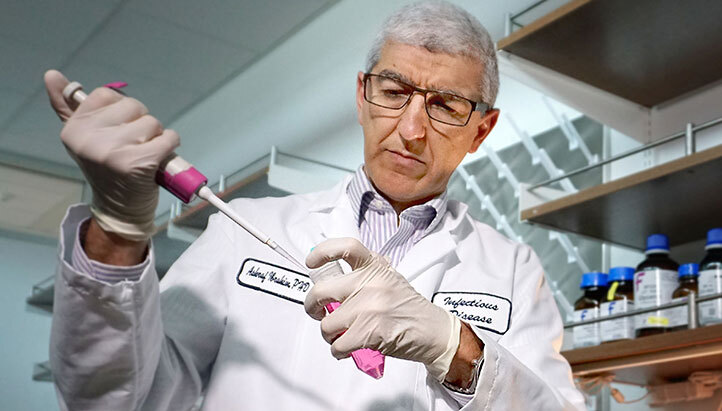Lundquist Research Is Lead Author for Groundbreaking Paper in Nature Microbiology
Ashraf S. Ibrahim, PhD, Lead Author, on publication in the world’s No. 1 Scientific Journal for Microbiology

LOS ANGELES — Today Nature Microbiology publishes The Lundquist Institute Investigator Dr. Ashraf Ibrahim and his co-authors’ paper, “Mucoricin is a ricin-like toxin that is critical for the pathogenesis of mucormycosis.”
In the paper, the authors propose the name “mucoricin” for the toxin that helps facilitate infection of fungi that causes mucormycosis* and they also indicate that it is a promising therapeutic target to combat the lethal effect of the fungi. Through gene silencing using RNA interference and blocking function of the toxin by antibodies, their research demonstrates that the toxin is critically needed to cause damage to mammalian cells.
“This is the first study to discover a Mucorales toxin that is responsible for mucormycosis pathogenesis,” says Dr. Ibrahim. “Importantly, the toxin ‘mucoricin’ shares structural and functional features with the potent plant ricin toxin. Importantly, antibodies targeting muricin protected mice from mucormycosis pointing to the translational potential of novel immunotherapies against this lethal fungal infection. Finally, the data suggest that ricin-like toxins are also produced by organisms beyond the plant and bacterial kingdoms.”
This study was conducted with National and International collaborators from University of Texas Southwestern Medical Center, University of Maryland School of Medicine, Wadsworth Center-New York State Department of Health, University of Sharjah (United Arab Emirates), Medical University of Innsbruck (Austria), University of Crete (Greece), and University Medicine Göttingen (Germany).
The paper is available at the following URL: https://www.nature.com/articles/s41564-020-00837-0
Financial Disclosure
Funding from the U.S. Department of Health & Human Services | NIH | National Institute of Allergy and Infectious Diseases (NIAID), the Division of Intramural Research, was provided to The Lundquist Institute to sponsor the research for this paper.
* Per the Centers for Disease Control (CDC), Mucormycosis (previously called zygomycosis) is a serious but rare fungal infection caused by a group of molds called mucormycetes. These molds live throughout the environment. Mucormycosis mainly affects people who have health problems or take medicines that lower the body's ability to fight germs and sickness.
